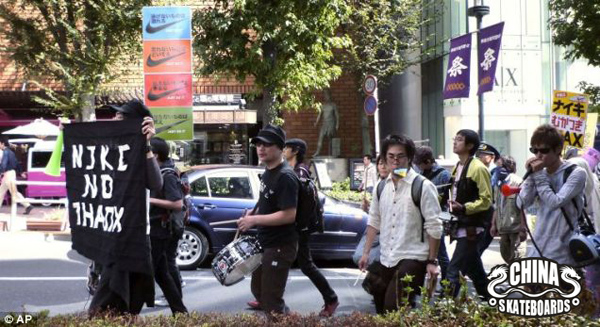
Japan Today消息,9月26日,大约200名抗议者在东京的Miyashita公园敲锣打鼓,挥舞着写有“No Nike”标语的旗帜,反对Nike在一处无家可归者聚集的场所修建滑板场的计划。
早在09年8月,Nike与市政府达成一项10年协议,计划建造一座滑板场,并在草地上鲜明的展示他们的钩标,并且以每年1千7百万日元的价格获取命名权。目前名为Miyashita Park的公园仍归市政府拥有和支配,不过将会更名为Miyashita NIKE Park。
周五,行政人员在警察的陪同下撕毁了擅自居住在此地的居民的帐篷,并丢弃他们的财物,30余名无家可归者被迫搬离该地区。
抗议活动的组织者Seiji Uematsu认为“这就是一个摆脱无家可归者的借口,如何使用这座公园应该由居民和游客决定。”
示威者在街道上游行并在东京Nike商店前高呼“不要为了表现自我而夺走我们的地盘。”
Nike女发言人Yoko Mizukami表示:“ 我们只是单纯的想通过这一计划让运动更贴近大众,我们希望得到一个正面的结果,但是我们现在所能做的就是等待。”
施工本应于4月开始,却因抗议者而再三推迟。该公园已于两周前封闭并由保安把守。
TOKYO — About 200 protesters banged drums and waved “No Nike” signs while marching Sunday in downtown Tokyo to oppose plans for a Nike-sponsored skateboarding park where construction has displaced dozens of homeless squatters.
The faceoff between protesters on one side and the U.S. sneaker-maker and the city on the other has underscored a relatively new debate in Japan about how to handle decisions on public space.
Under a 10-year deal signed August 2009, Nike Inc is planning to build a skateboarding facility sporting its “swoosh” logo in a grassy area and is paying 17 million yen a year for “naming rights.” The park, now called Miyashita Park, will continue to be owned and operated by the city government, but will be renamed Miyashita NIKE Park, serving as an ad for the world’s biggest athletic shoe and clothing company.
Officials accompanied by police tore out the squatters’ tents from the park Friday and threw out their belongings. More than 30 homeless people were forced to vacate the area, according to Yasumasa Hioki, director of public works at Shibuya district, an area filled with fancy boutiques and young shoppers.
“This is just an excuse to get rid of the homeless,” said protest organizer Seiji Uematsu, adding residents and visitors should decide how to use the park.
The group of protesters, some wearing colorful costumes, marched through the streets and in front of a Tokyo Nike store shouting, “Don’t take away our space for self-expression.”
“We simply want to bring sports closer to people with this project,” Nike spokeswoman Yoko Mizukami said. “We are hopeful for a positive outcome, but all we can do is wait.”
Those who oppose the plan, the Coalition to Protect Miyashita Park From Becoming Nike Park, say the favorite spot for rallies and demonstrations is becoming commercialized.
Construction was supposed to have started in April, but has been repeatedly delayed because of protests. The park was sealed off two weeks ago, and security guards stand at the gates.
“Ideally, public space serves as a laboratory of democracy and civility,” said Christian Dimmer, who specializes in urban planning as a researcher at the University of Tokyo. “The future of a collective resource like public space should be broadly discussed by all members of a society, and not in shady back-room dealings.”







